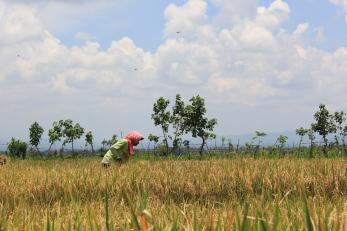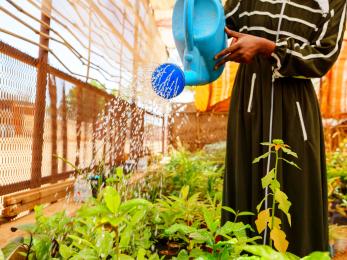Cultivation techniques and financial management help to raise yields and improve farmer productivity among female smallholder farmers in Indonesia

25 million smallholder farmers in rural parts of Indonesia struggle to earn a living at or near poverty wages. Lack of access to markets and financial services limits their ability to optimize their crops and maximize their distribution channels. Public investments in agricultural R&D as well as extension and advisory services should be increased to emphasize sustainable intensification, raising yields and closing farmer productivity gaps. Agricultural research and advisory services should therefore seek to raise productivity, improve sustainability, lower food prices, reduce poverty, etc.
The Agri-Fin Mobile program has made available to targeted smallholder farmers a number of services including agricultural advisory services, mobile payment services and financial literacy. The number of smallholder farmers with access to the services provided by the partners of the Agri-Fin Mobile program has grown significantly since the launch of the LISA platform with over 10,000 farmers taking part in the financial literacy training.
Ibu Tati Sulastri aged 46, is one of the female farmers who have undergone financial literacy training and receives agricultural advisory tips from the LISA platform, used by Agri-Fin mobile program in Indonesia. Married with two children, her husband is a Perhutani (state forestry company) employee and her older child works in Bandung, while the younger has just started university. Ibu Tati feels that if the family’s income came only from her husband’s salary, it would not be enough to meet their many needs, especially for the children’s education. To supplement their family income, they have an agribusiness of vegetables (chilies and long beans) on one hectare of land.
In addition to managing their own farm land, the family also farms three hectares of Perhutani land, which is planted with rice in an inter-cropping system with small eucalyptus trees belonging to Perhutani. All this land depends solely on rainfall, and is planted twice per year.
Until recently, Ibu Tati has conducted her farming business following the habitual practices she inherited from her parents. The Agri-Fin Mobile training has given her new hope for a better future, particularly through efforts to improve cultivation techniques and financial management. Thanks to taking part in the Agri-Fin Mobile training, Ibu Tati can now access the LISA services, receives daily tips, and can ask questions directly to agricultural experts.
One tip from LISA that she has put into practice is the making of compost, because she has plenty of material available for compost production. Ibu Tati owns 15 sheep, which produce quite a lot of manure. She now makes organic fertilizer from the sheep manure for her chili and long bean plants. Previously, the cost to buy fertilizer for one hectare of land came to Rp. 1,200,000 (about $96), but now that she uses compost, she only spends Rp. 800,000 ($64) on fertilizer, thus saving Rp. 400,000 ($32).
Ibu Tati has sends questions in to LISA quite often. An example being “My chili plants’ leaves are shriveling; what should I spray them with?” LISA’s answer: “If the chili leaves are shriveled and stiff, this may be due to a virus carried by Thrips (Thrips parvispinus). The control is as follows: 1) do not plant on a large scale (>3 ha) 2) botanical insecticide: brotowali + turmeric + quicklime 3) insecticide with active ingredient imidacloprid or fipronil [H. Toto, Extension worker at BP3K Cilwet]”. Because there was no brotowali (Tinospora cordifolia) available where Ibu Tati lives, she used the third suggestion, and her chili plants’ leaves returned to their normal healthy green.
Thanks to the explanations about financial management, Ibu Tati has become better able to distinguish between needs and wants. Ibu Tati is now more enthusiastic about setting aside money to boost her savings. Following the suggestions given at the training, she plans for the use of her money and has significantly reduced her expenditure. As Ibu Tati’s savings grow, her hope that her second child will graduate from university is closer to being realized.

